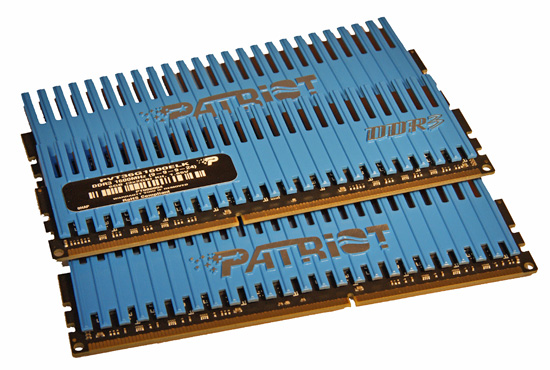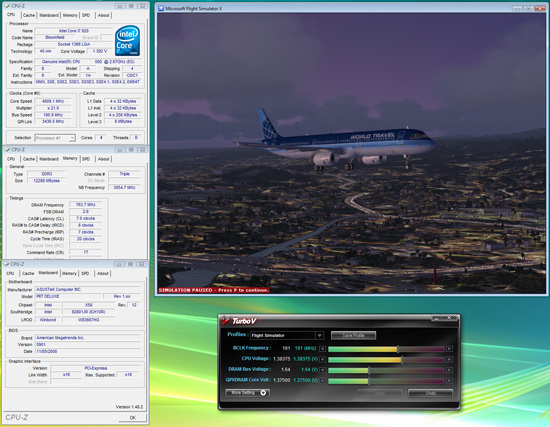Lab Notes - Core i7 920 OC with Patriot Memory DDR3
by Gary Key on November 12, 2008 12:00 AM EST- Posted in
- Gary's First Looks
We have been busily preparing an X58 motherboard roundup and overclocking guide that will be published shortly. During the course of testing over the past few weeks we have encountered more than our fair share of problems. Problems ranged from poor GPU driver support to BIOS releases that had difficulty booting 12GB memory configuration much less offering a decent performance or overclocking experience.
We are still not pleased with multi-GPU performance on the X58 platform and even less pleased that we do not expect to see several problems fixed until December. That is a story for another time, but had we known ahead of time the number of problems we would encounter, our graphics card of choice for motherboard testing would not have been from AMD.
As for the motherboards, well we are finally at the point with the latest BIOS releases that we would not hesitate to purchase an X58 platform now. Our latest BIOS releases from ASUS, MSI, Gigabyte, and Intel are finally up to speed, not that they are perfect, but certainly worthy of stable 24/7 operation. Memory compatibility and performance is greatly improved, on-board peripherals are working properly, and overclocking capabilities are up to speed now. We are utilizing the following BIOS spins for our two roundups, ASUS P6T-Deluxe (0901), ASUS Rampage II Extreme (0602), Intel DX58SO (2724), MSI Eclipse (1.121), and the Gigabyte GA-EX58-UD5 (F3D). One note of interest is that we had several problems with our Rampage II Extreme board in regards to memory compatibility and overclocking. The 0602 BIOS certainly improved the situation but ASUS has updated the board and retail units will incorporate the latest component updates.

In the meantime, we have burned through our credit lines at Newegg purchasing various DDR3 memory kits that are specified for use with the X58 platform. Our latest purchase was 12GB of Patriot Memory PVT36G1600ELK featuring 9-9-9-24 timings at DDR3-1600 on 1.6V or so. Patriot also offers the PVT36G1600LLK kit that features timings of 8-8-8-24 at DDR3-1600 speeds on the same voltages along with additional overclocking headroom.
 |
One of our new benchmark tests is Microsoft's Flight Simulator X with the Acceleration expansion pack. FSX is multi-core aware and the i7 is a perfect match for this normally CPU intensive game. Utilizing the ASUS P6T-Deluxe, i7 920, CoolIT System's Freezone Elite, Sapphire HD 4870, and 12GB of Patriot's latest memory we were able to push the system to a 24/7 benchmarking friendly 4009MHz (21x191) with memory speed at DDR3-1528 on 7-8-7-20 1N settings. Our settings consisted of 1.3975V VCore, 1.64V VDimm, and the secret sauce setting of QPI (VTT) voltage at 1.3750V. Our FSX settings were run at Ultra High with AA/AF/DX10 enabled in order to stress the CPU and GPU during the benchmark sessions.
Keeping VCore, VDimm, and VQPI in proper sync is the key to a stable overclock at voltages that will not shorten your processor's lifespan, well not by that much from what we can tell at this point. Intel's guidance continues to be not setting VCore past 1.55V, VDimm past 1.65V and VQPI (uncore to us) past 1.315V when overclocking. Kris will go over this in detail shortly, but in my experiences so far, getting these three voltages too far out of sync will quickly cause problems as one of our i965 processors can attest to now. Keeping them in sync and tweaking a few other settings will result in a finely tuned system that is capable of running settings higher than Intel's guidance although it is a warranty buster. At this point we like to keep VCore and VQPI (VTT) within 0.0250~0.0375V of each other as you clock up, generally speaking, once you exceed about 1.3V on VCore it is time to start syncing these settings and others in the BIOS.
For us, VQPI (VTT) is one of the most sensitive settings in the BIOS and one that will reward the user with higher bclk and mclk capabilities quicker than most other settings (except VCore/VDimm, although clock skews and amplitude are critical tuning settings also). When tweaking the BIOS, raising VQPI will generally allow memory speeds to either increase or memory timings to decrease without raising VDimm at certain gates. Depending on the memory utilized, you can even trade off higher VQPI for lower VDimm and improved timings, it's all a balancing act. In fact, our Corsair DDR3-1600 6GB kit is capable of running at DDR3-1066 on 5-5-5-15 timings with 1.58V VDimm and VQPI raised slightly to 1.2125V.
The same holds true for running VCore slightly lower when you are looking for the highest possible overclock without exceeding the capabilities of your cooling solution. While the cascade and LN2 users will see different results and can push settings a lot further, for those of us on air or water, these settings are critical to getting the most out of this platform in a 24/7 environment.
We will be back shortly with additional results. In the meantime, we had excellent results with our first X58 specific memory kits from Patriot Memory and the retail Core i7 920 that features unlocked memory multipliers.
















13 Comments
View All Comments
Nfarce - Friday, November 14, 2008 - link
Finally I can stay at AT for all my benchmark needs instead of straying over to Tom's Hardware *just* for FSX benchmarks. What took you guys so long? There are millions of FS(x) users out there too.Mr Roboto - Friday, November 14, 2008 - link
It's pretty amazing to see Intel introduce a whole new native quad core architecture and the first time that they have incorporated the memory controller on die too, and still see overclocks on par with Penryn.Those are the kind of stable clocks I'm getting on my E8400 using a Thermalright Ultra 120. For a dual core it's great and I've even had it up to 4.5Ghz@1.42v for short periods for benching and such but it just gets too hot. But to be able to get those kinds of speeds with Intel's first crack at a native quad core design is simply amazing!
I hate to sound like a total fanboy (Cause I'm really not) but to see the trouble AMD has gone through trying essentially the same thing just adds to Intel's accomplishment even more IMO.
Well here's to hoping AMD comes out with something amazing themselves to help drive the babies down :).
JonnyDough - Friday, November 14, 2008 - link
Intel is more than ten times the size of AMD. The fact that AMD can even compete puts them on a whole other level. You did sound QUITE fanboyish.Thund3rb1rd - Saturday, November 15, 2008 - link
WTH are you talking about...AMD is NOT competing. Not even even the same league, albeit in VM land (note to intel, throwing cpu cycles at the problem is not the answer).samw5 - Thursday, November 13, 2008 - link
I thought the 920 had the multi locked at 20!msgclb - Thursday, November 13, 2008 - link
I'm still waiting on FedEx but what I've read is that with Turbo Mode the 920 can add up to 2 multipliers on the default frequency. So on a light load the 920 would run at 21x133 MHz and under a heavy load at 22x133 MHz. How and if this works overclocking the Core i7 920 and ASUS P6T is one of the many things I hope Gary covers in his full review.msgclb - Thursday, November 13, 2008 - link
I'm glad to hear that you wouldn't hesitate to purchase a X58 platform now as I couldn't keep my finger off the buy buttons. Your blog left we with a couple of questions. I've got a ASUS P6T Deluxe, Core i7 920 and 6GB of Patriot PVT36G1600ELK ordered along with a Sapphire HD 4870 that I already own. I'd love to get another 6GB but I've already busted the bank! I've noticed that the latest BIOS on ASUS's site is 0804. Is 0901 a beta and do you know when it will be available? Does FSX run better with 12GB or will 6GB be enough? I looked through your motherboard reviews but couldn't find FSX as one of your benchmarks. Is this the first time you've used it?Looking forward to your full review.
geofelt - Saturday, November 22, 2008 - link
I have just built the same system and am wondering what is fixed in 0901? The motherboard came with 0703, and there is no documentation about that.Barbu - Thursday, November 13, 2008 - link
I'm glad that you started to use some other games; GRID and FSX are a welcome break from the unending string of shooters, RPGs and RTSs.Even if I'm not playing FSX, I'm a simulation enthusiast and in here usually the CPU is taxed as hard as the GPU.
Keep'em coming!
Devo2007 - Wednesday, November 12, 2008 - link
As someone who also owns a Freezone Elite CPU cooler, I'm curious to know the temperature readings you're seeing with this setup. I'm looking to upgrade to i7 early next year (probably a 920, though I might step up to the 940).